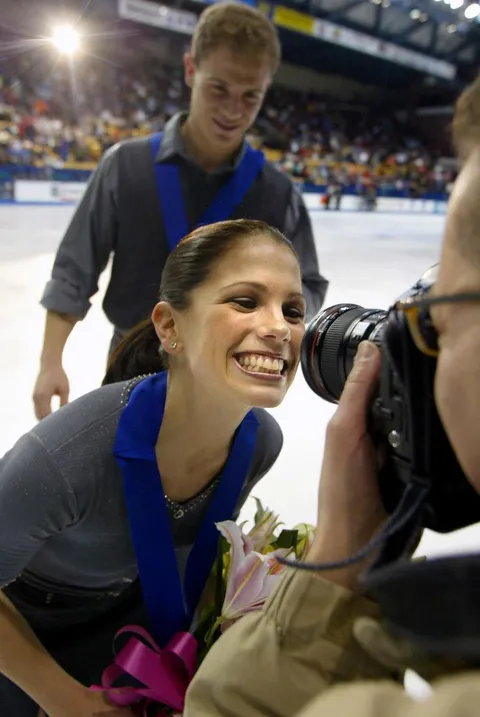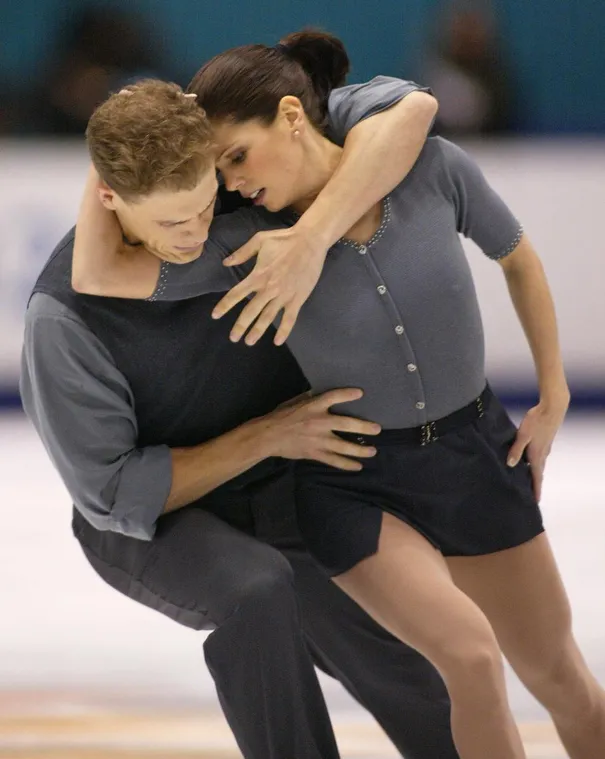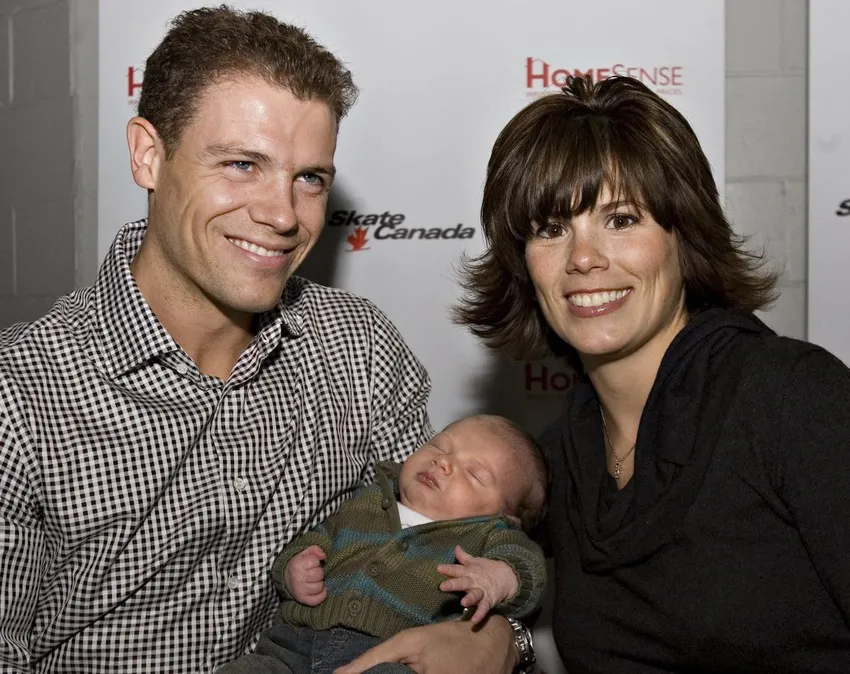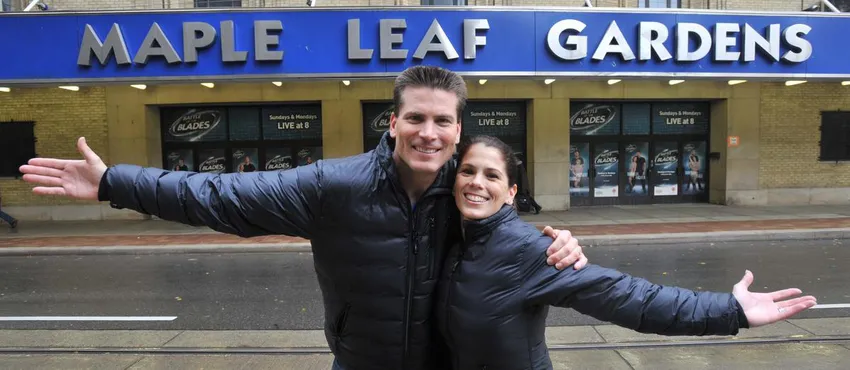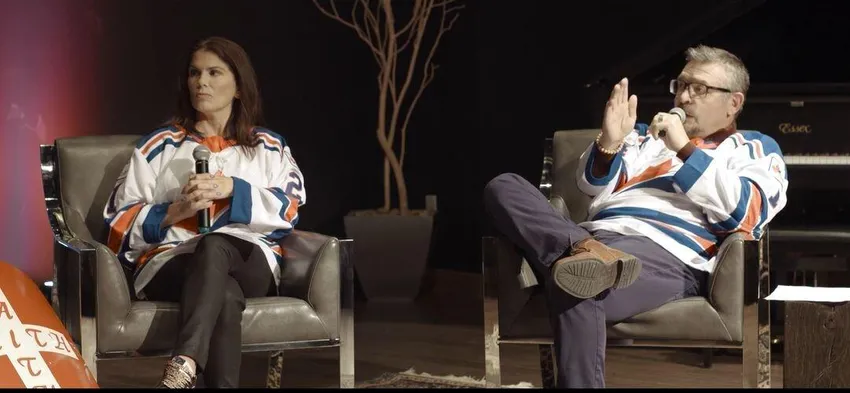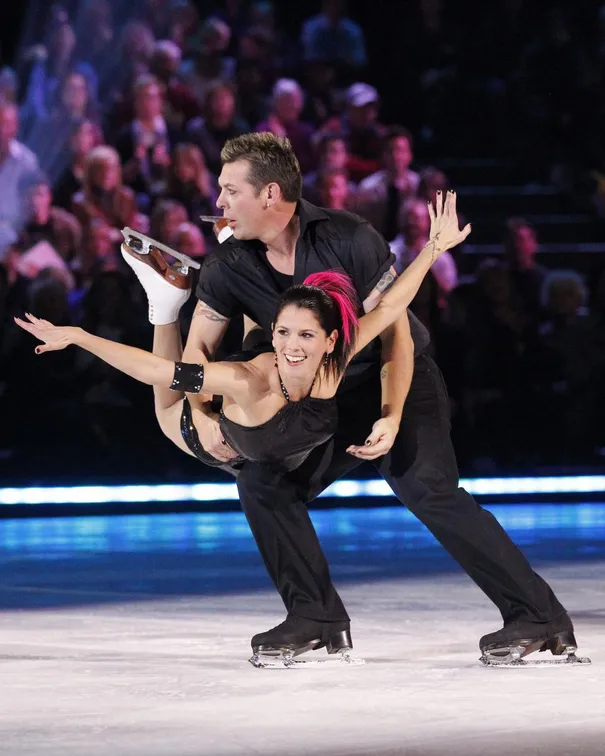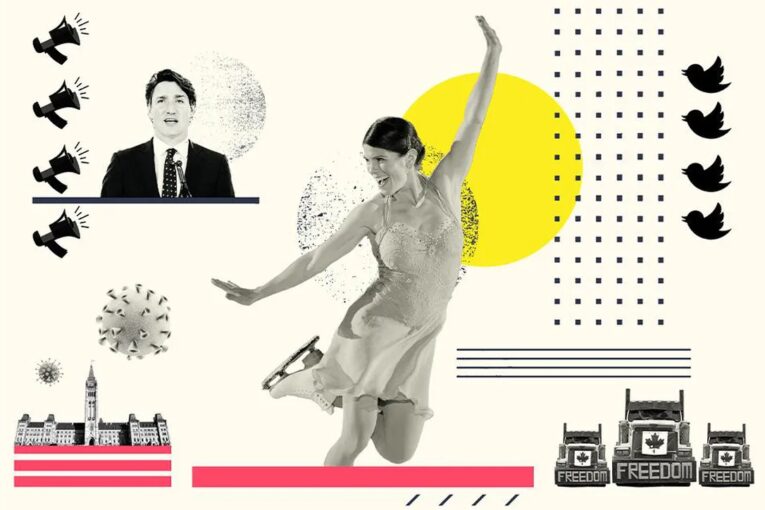
CALGARY—When it comes to greeting a crowd of adoring fans, Jamie Salé’s still got it.
She shakes hands and hugs, she smiles wide and, if you’re lucky, leans in close to whisper a few words.
The crowd this day mills in front of her, the carbonated vibe of a high school reunion bubbling just below the surface.
To the extent that Salé has aged since her iconic skating performance at the Winter Olympics two decades ago — after which a presumed gold medal was snatched away, so the story goes, by a corrupt French judge — the effects are subtle. The big brown eyes and the tightly coiled earnestness remain, as does her gravitational pull.
People come up for photos — someone pulls their cousin forward, then it’s the turn of the “Saskatchewan crew” — and the chatting pauses just for a moment as someone aims a smartphone, and Salé, always the shortest in the group, beams that megawatt smile.
Others crowd around a merchandise table — hats are $25, hockey jerseys are $160 — and a leader of the convoy movement that ground Ottawa to a halt last winter walks through with a tiny dog, impressively unimpressed by the surrounding hubbub.
While Salé remains a hero of Canadian sport, the crowd gathered in the beige-toned lobby of a Calgary office block has come to witness the birth of a new kind of star — a peppy, bright-eyed advocate for a wide-ranging theory that COVID was a hoax, the mainstream media (hello!) is lying to you and our leaders should be in jail.
Salé has questioned, without evidence, the safety of vaccines, tweeted memes that seemed to support military tribunals and appeared to compare Justin Trudeau to Hitler. To be blunt, most Canadians would find Salé’s stance appalling. Most, but not all. The ideas she espouses are consistent with a growing movement, born of cherry-picked data, conspiracy theories and the opinions of scientists rejected by their peers that rose to new heights during three years of pandemic public health measures and isolation.
“We’ve been led by a bunch of criminals, basically, our whole life,” Salé recently told a podcast host and Alberta lawyer Leighton Grey, who resigned from a vetting panel for new judges after comparing COVID vaccines to Auschwitz tattoos. “We’ve been lied to since the minute we were born. And we’ve been enslaved since the minute we were born.”
If Salé’s words come as a surprise to you, you’re not alone. They would be a shock even to the Jamie Salé of 2020 who, by her own admission, whiled away the first pandemic months wearing masks and worrying about the spread of disease, even, as she told one podcaster, lecturing her ex-husband and former skating partner on the importance of social distancing.
She has been called a “lunatic” and a “bigot,” she acknowledges. Nevertheless, her Twitter following has swelled seven-fold.
And now, she has her sights set on creating a new media company — a project meant to give voice to her version of the truth.
Salé declined repeated requests from the Star for an interview, saying in an emailed statement that the Star’s use of terms such as anti-vaxxer and conspiracy in its correspondence was “unacceptable.”
She wrote that her movement is coming at a time when “Media and our Government has sold out,” and that she and others intend to create an environment “full of energy, hope, healing and awakening.”
“This is a movement that will unite Canadians, and we know this because they are coming to our shows and leaving with pride to be Canadian once again.”
This story relies on multiple podcast interviews Salé has done over the past year. The Star also spoke to former friends and associates who painted a picture of a rapid shift in priorities that took many of them by surprise, and of a woman who has chosen a new ideology over old friends and loved ones.
“We can’t quit, like, if we quit, we’re duped.”
What is undeniable is that she’s riding a wave of anger and distrust of power in a polluted information stream.She’s on one side of a divide that seems increasingly hard to bridge, and deals with the very nature of truth, lies and the threat posed by a global pandemic.
If sacrifice is a measure of faith in the cause, Salé has the marks of a true believer. She told a podcast host in August that while her marriage had been shaky before, her new views were a contributing factor in a separation from her second husband, Craig Simpson, a square-jawed left-winger who played 10 seasons in the NHL.
Former friends no longer speak to her. She’s been called every name in the book. Yet her conviction appears unshaken.
The irony is that if there’s anyone with a right to believe in a world of conspiracy, it might be the diminutive skater from small-town Alberta who was once cheated out of a gold medal.
“That’s what I learned in my skating scandal, but also, you know, that we can’t quit, like, if we quit, we’re duped,” she told a podcast in August.
“So I’m not a quitter.”
Jamie Salé’s backstory
Jamie Rae Salé grew up in a bungalow in Red Deer, a small low-slung city in Canada’s Conservative heartland, almost exactly the midpoint on the ruler-straight highway between Edmonton and Calgary.
Her father would make a rink in the backyard for her, Salé recounted in “Meddling,” a recent four-part docuseries about the Salt Lake skating scandal.
“I was that family entertainer,” she says in the documentary. “I was always asking everyone to ‘Sit down, I’m going to perform in front of you.’ Maybe just trying to overcompensate for that insecurity that I felt inside.”
That nagging insecurity was born of being made fun of in school, of her parents divorcing and of being separated from her brother in the aftermath, she says in the documentary. Her mother struggled with depression and a preteen Salé would scribble supportive notes to “the best mom in the world” to get her through the day.
Hitting the ice was an escape from the pressures at home, she says, and she was good at it. It wasn’t long before the young athlete was being ferried by her mother to Edmonton several afternoons a week after school to practise at the Royal Glenora Club, the tony facility next to the North Saskatchewan River, where luminaries such as Kurt Browning and Kristi Yamaguchi had once trained.
“I used skating as my coping mechanism,” Salé explained on another podcast, hosted by Nicole Murphy, a former instructor at an Edmonton technical college who says she was let go after questioning COVID measures. “It was my outlet to feel important and feel loved, and feel that I was filling that void.”
At first, success came quickly. At 16, Salé was the youngest member of the Canadian Olympic team when she travelled to Lillehammer in 1994 and placed 12th in pairs with then-partner Jason Turner. But then she hit a slump. That partnership fizzed. She struggled with injuries. She got a job waiting tables.
Then, in 1998, Salé hit the ice with a curly-haired Québécois named David Pelletier. Until then, he’d struggled to find a partner, but something clicked.
The duo, who would eventually generate sparks on and off the ice — so much so that Chatelaine would later dub them the “Brangelina of the ice” — won three consecutive Canadian Championships followed by a World Championship in 2002.
In a sport that catapults top athletes into a world of travel and glamour, Salé stayed close to her small-town Alberta roots, and made no bones about eschewing fancy hotels or picking up her coffee from Tim Hortons. She was known for her bubbly personality and outsized laugh, but prided herself on her toughness, too.
Then came the Olympics, and the four minutes that still define her two decades later.
The Salt Lake scandal
In the 2002 Salt Lake Olympics, on an ice sheet awkwardly configured on top of a basketball court — local media took to calling it “The Pit” — Salé and Pelletier performed their crowd-pleasing, competition-tested routine to the soundtrack of the 1970 film “Love Story.” The performance was widely considered a career best.
After they finished, the announcer called it “one of the great skates in Olympic history.” Pelletier kissed the ice.
When the gold medal was awarded to a Russian team instead, the ensuing controversy catapulted the two Canadians into international stardom.
Before the dust settled, Salé and Pelletier would be flown by chartered jet to appear on “The Tonight Show With Jay Leno” and were spoofed on “Saturday Night Live” by Amy Poehler and Will Ferrell, the latter attempting a Québécois accent.
They were hounded by media, scrutinized in a way that would be considered far less acceptable today.
The spotlight, it seemed, took a toll on Salé. This, after all, was a sport where the female half of the team must perform jumps that are more difficult relative to their male counterparts, must accept the risk of being flung through the air, their very physical presence measured and weighed. Her distrust of media was already apparent, says a reporter who covered her at the time.
“I was that figure skater that went to the Olympics and won gold for Canada … (with) my cute little ponytail,” she recounted recently on a podcast hosted by Kaylor Betts, who describes himself as a mental “wealth” coach. “It was like this Canada sweetheart thing, I never spoke out about anything, I hated politics,” she said, sounding exasperated.
She had put everything on hold, had sacrificed and subjected herself to endless scrutiny, to reach the pinnacle of achievement in her sport. Now she had to face what was next.
A post-Olympic ‘fairytale’
Her post-Olympic years were a roller-coaster, Salé wrote in a guest essay for the now-defunct StarMetro Alberta papers in 2019, the love and success she attained unable to overcome the sense that something wasn’t quite right.
After finally getting their gold medal, she and Pelletier married in 2006 at the Banff Springs Hotel in the Rocky Mountains, then had a child. They were living “almost a fairytale really,” she wrote. One that came crashing down.
Then she’d rebounded yet again, she wrote, meeting and marrying Simpson, her “new wonderful husband,” and enjoying a life blessed with fabulous friends and a loving, fun-filled family.
Still, it hadn’t been smooth sailing, she recounted. She’d begun noticing feelings of “emptiness and discontentment,” and thought there was something wrong.
“Looking back over the past four decades I can see a common thread in my life,” she wrote in the piece, parts of which were published online. “Life will teach you lessons and it’s important to have a plan, to continue to dream and set an intention to live with purpose so our journey here can be fulfilling.”
Since hanging up her skates, Salé had been heavily involved with Special Olympics, even coming along on competition trips and developing a reputation as someone with a knack for bonding with fellow athletes. She dabbled in business partnerships and launched a career as a life coach, posting videos to her Facebook page urging people to find their purpose.
“Working with people — helping them realize their goals — is so fulfilling,” she wrote, not quite three months before the first COVID case would be identified in Canada, in a traveller who had returned from Wuhan, China.
“I am so blessed … what a life … I am thankful for it all!”
COVID vaccines and a ‘red flag’
When the pandemic hit, many people were stuck at home, cut off from friends and family, from co-workers, from the guy who runs the corner store. In many cases, social media provided the windows by which we kept tabs on one another.
In May 2020, just months after the first case of novel coronavirus was confirmed on Canadian soil, Salé posted a picture to Facebook in which she and Simpson, her husband, beam in matching black T-shirts, the words CONQUER COVID-19 blazed across the fronts.
The shirts were sold as part of a celebrity-endorsed fundraising project to buy masks and gloves for front-line workers.
In the caption of the image, posted to Salé’s Facebook’s page, she praised the “amazing initiative” and urged her followers to buy their own.
“Why is this you have to get (the vaccine) — or else? Why is this not freaking you out?”
But something began to change, as that first pandemic summer turned into fall. As Salé would recount on podcasts, a lifelong suspicion of the medical field began to give way to suspicions about COVID.
For many, the rollout of the first COVID vaccines to grey-haired nursing home residents was joyous. To Salé, the shots seemed to mark the beginning of a new societal divide. As she tells it, the issue wasn’t just about vaccines but the insistence that people get one.
A turning point seems to have come when a young family member insisted on getting a vaccine, over Salé’s objections, after being excluded from a social event. People around her argued that remaining unvaccinated wasn’t worth not being able to fly, or eat out, or sit in the stands at a hockey game. The measures had been put in place because the majority of public health experts argued they’d encourage more people to get vaccinated and ease pressure on the health-care system. But Salé saw nefarious intentions.
“I said, ‘is that not a red flag? Like, why is this you have to get it — or else? Why is this not freaking you out?’ ”
Not to mention, she’s said, that she felt alone.
Salé has paid the price for her convictions, as odious as many Canadians might find them.
By July 1, 2021, Salé and Simpson were no longer living together, according to the divorce documents that Salé would file the next summer.
(Simpson did not respond to request for an interview. In February 2022, someone on Twitter tagged him in a tweet that questioned whether he shared Salé’s beliefs. “We have been separated since June, and I am blocked from her account so not sure what you are referring to,” he wrote. “I am not involved.”)
Her marriage had been shaky before, she says, but Simpson’s refusal to get on board was the final nail in the coffin.
“My marriage was already on the rocks and because he chose to basically do this to me,” she said on Grey’s video podcast in the fall, sticking her fingers in her ears, “and not listen to anything I had to say, told me I was a little bit crazy, that I’m down this conspiracy path.”
Salé has also been scrubbed from the website of the consulting company she was working with in Edmonton and parted ways with Special Olympics in 2021. An award formerly given out in her name was re-christened a year later.
“She is no longer associated with our organization,” Sue Gilchrist, head of Special Olympics Alberta, said in a recent call. “I just want to make that very clear.”
The Freedom Convoy
While Salé’s status as a Canadian sweetheart is unique, in some ways she’s a high-profile standard bearer of a phenomenon happening in living rooms across the country.
As pandemic restrictions wore on, many people moved their social lives online. For many, those digital worlds were a refuge, a place to seek out like-minded friends and build community. But they also provided the opportunity to build worlds based on fear and misinformation, not based on evidence, says Tim Caulfield, the Canada Research Chair in health law and policy at the University of Alberta who studies misinformation.
In early January 2022, the movements that had coalesced online in opposition to COVID public health measures spilled into the streets. A wide-ranging group of people, calling themselves the “Freedom Convoy,” used trucks and trailers and even a bouncy castle to snarl downtown Ottawa.
After months of restrictions, Salé saw it as a sign that there were people out there who thought as she did. To her, it was a beautiful party, with kissing and hugging and dancing, she said, addressing a recent crowd in Calgary. “It was as patriotic, or in some ways, because of what we’re going through in this spiritual war, more patriotic for me than my Olympic experience,” she said on a podcast this fall.
In some ways, the convoy has become a Rorschach test for how you view the past three years.
“The convoy really, really lifted me up.”
The convoy remains unpopular with Canadians, the vast majority of whom are vaccinated. Fifty-four per cent of people surveyed found the protests did not “deserve any of our sympathy,” according to a poll released last year, citing the mess, constant honking and extremist elements.
To Salé and many others, the convoy remains an event to celebrate. Concerns about extremism, she insists, are overblown by a biased media, any unrest spurred by antifa.
“The convoy really, really lifted me up,” she said recently in a podcast interview.
The event returned a year later; smaller, quieter and arguably humbled. But while the protests may be dwindling, the ideology they exposed is not. Because they confirmed what many already knew, that the country seemed to be cleaving into groups that disagreed, not just on politics or health policy, but on the very set of facts that underpinned those decisions — perhaps on reality itself.
And Salé had picked her side.
Salé’s search for truth
At its most basic, a conspiracy theory is the belief that shadowy figures are secretly holding the puppet strings, controlling current events or circumstances. The pandemic provided the rocket fuel to create a turbo-charged version: that the virus that held our planet hostage wasn’t real, that scientists were lying to you and that leaders, such as Justin Trudeau, were mere puppets for the real bad guys.
“I know that everyone goes, ‘Well, what is the truth?” Salé said in mid-2022, in an interview with Rebel News.
“We know there is a truth out there about all this and what the agenda is all about,” she says with a slight smile. “That is what we’re trying to get people to be aware of, that, you know, we’re being led down a very dangerous path.”
Susceptibility to conspiracy theories often begins with dissatisfaction with one’s circumstances, says Barbara Perry, the director of the Centre on Hate, Bias and Extremism at Ontario Tech University. The pandemic has been devastating for so many people, mentally, emotionally and physically — many people have taken the opportunity to rethink everything.
“If someone is providing explanations to them for why they’re in the situation they’re in, who is to blame, that it’s the government, it’s the great world order,” she said. “You know, it’s comforting, I think.”
A belief in one theory can begin to bleed into others.
Salé’s Twitter account shifted quickly from pictures of families to recirculated memes claiming hospitals are profiting from COVID deaths and that mRNA vaccines are gene therapy. (They’re not.)
“People lost it on me.”
She’s taken fire for comparing Trudeau to Hitler, a decision she defends. “It wasn’t saying that Trudeau mad!” she said gleefully, as the room laughed.
“Sometimes I’ll get the odd person that will give me a bit of their background. They’ll say, ‘Well, Jamie, I’ve lost a family member to COVID,’” she said. “If I see them I will say to them, ‘I’m very sorry that your family went through this.’”
“But in my mind I’m like, ‘They murdered your mother or your aunt or your grandma or whatever, because they went into the hospital and they didn’t get proper treatment and then they got put on ventilators.’ ”
The intensity of those peddling post-COVID conspiracy theories is something that Perry isn’t sure she’s seen before: “I mean, I’ve been working in this space for 30 years, and I’ve not seen really anything like this, not at home, not this widespread, not this convoluted,” she said. “The grasping at straws.”
One of Salé’s former friends sees it a bit more simply. “I think she was trying to find a place to fit, and just got dragged into something that is uncontrollable.”
Pleasing the crowd with Theo Fleury
If you thought that half a lifetime performing for crowds of thousands was inoculation against the butterflies, you’d be wrong.
“We’re always nervous,” Salé says with a laugh, perched in a lounge chair at a recent live taping of one of her new shows, “Fire and Ice,” with former NHL player Theo Fleury. (The latter used to play for the Calgary Flames; Salé, as a retired skater, is the ice here.)
Back in the limelight, Salé seems to tap her considerable experience as an on-ice performer, laughing riotously at Fleury’s jokes, gesturing broadly to the crowd, her facial expressions stretched wide. In this tiny auditorium, their easy camaraderie is visible from the nosebleeds.
Tonight, with the help of a carpet and some grey chairs, the space is a launching pad for what Salé, Fleury and the other organizers hope is something much bigger. They’re part of an organization called Canadians for Truth, started by Joseph Bourgault, the second-generation owner of a Saskatchewan company that makes farm tools, whose other recent claim to fame was a failed attempt to join the leadership race for the Conservative party.
Bourgault and Fleury approached Salé a few months ago, she says, in pursuit of a dream of uniting those who see the world the way they do.
Salé will also host a solo show called “Unstoppable Truth” — named for the Sia song of the same name — featuring one-on-one interviews that will, as Salé wrote in a statement, “demonstrate that it is OK to be vulnerable and to have alternative opinions.”
Right-wing media, as a business, has exploded in recent years, though it’s not clear yet how big this network is or might become.
The Calgary theatre is rented from a home builder, its seats full of people paying $50 a pop. Above it, Canadians for Truth says it’s building a state-of-the-art studio.
In one interview, Salé said that they’re “connecting with some very high-profile people in the U.S. to get that support.” On another, she explained that “ultimately, we want to grow it,” and that “I believe that we could even be eventually the media, because the media will be no longer.”
In the theatre, the crowd drinks up the energy coming off the stage and volleys it back, cheering when prompted and responding with exhortations of “No!” and “That’s bullshit!” and, when appropriate, a murmured “Amen.”
To Salé, the word for someone who hasn’t yet woken up to her version of the truth is “asleep,” and these people slumber, presumably, absorbing the scientific advice and official guidelines until being jolted awake. It’s a term popularized by QAnon, the U.S. political and conspiracy movement that believes in a Great Awakening, or a moment in which everyone will be made aware of how the world really works.
There’s no question that Salé has paid a high social cost for her beliefs, but as her old friends have fallen away, new people have seemingly replaced them.
She and Fleury’s friendship has the most Canadian of pedigrees — they met as teammates at the Salt Lake Olympics, during which they’d say hello in passing or wish each other luck, but their bond was truly cemented during the second season of “Battle of the Blades,” the now-defunct CBC competition show that matched figure skaters with hockey players and tasked them with performing gravity-defying pairs routines.
The duo went out on a routine performed to “Stayin’ Alive” in which Fleury dropped Salé, but that blip aside, he remains a close friend and fierce protector whose loyalty extends to lecturing a reporter who bought a ticket to their event. When Salé first started to come awake, as she puts it, he was one of her first calls.
Fleury also has a history of controversial statements. In launching their new media show, both reference their athletic pasts frequently, and where Salé took from her Olympic scandal a mission to always question authority, Fleury taps his honest and authentic history as an abuse survivor when he takes aim at what he says is the government’s abuse of power.
The Star did speak to Fleury, who took issue with the Star’s questions about vaccination and public health policies, and argued the public has not treated Salé fairly as a woman standing firm in her convictions, calling Salé “one of the most incredible human beings I’ve ever met.”
Fleury has been a major source of support to Salé in recent months — she said on one podcast that she’s messaged him “probably 50 times in the last six months,” asking him how he deals with the online attacks and how he keeps going.
“And he’s like this to me: ‘Jamie, it’s either that or we die,’ ” she recalled.
“That really resonated with me, because I thought it was kind of like skating and it’s a bit of a different scenario, but I’ve been through scandal,” she said, speaking with her usual urgency. “And it was about taking the high road.”
Salé’s ideas find support
Salé and Fleury are preaching to the truly committed, but there are signs that these ideas are spreading more widely. Caulfield, at the University of Alberta, points to an Abacus Data survey of 1,500 Canadians from June that found that 19 per cent of them believed, contrary to the evidence, that COVID vaccines “have killed many people which has been covered up” — and that another 25 per cent thought it was possible or weren’t sure.
That same survey found 11 per cent of respondents believed that the vaccines had “secret chips designed to monitor and control behaviour.”
He worries about what he refers to as the revisionist history of the pandemic, in which more people seem to be forgetting the first days and abandoning earlier convictions that the virus was deadly and that public health protections were necessary — and drawing much darker conclusions instead.
It’s a shift steeped in a brew of populism and polarization, and dialed up by the social media networks that can take a post from fringe to centre stage almost immediately.
“There is a limit to how far this noise can do damage,” he says. “But who knows? It’s a really scary time for truth.”
Jamie Salé looks beyond the ‘hate’
Dressed in a red sweatshirt with “Lover” on the front, Salé speaks with a sense of upbeat urgency as she sits on a couch beside the interviewer. If online conspiracy theorists sometimes get stereotyped as confrontational and loud, Salé leads the approachable soccer mom offensive, her bright pink nails immaculate, a tiny dog occasionally hopping into her lap. “I’m surprised my cat’s not here, too!”
Many of her interviews come back to the personal toll of this new journey that she’s on.
She says she’s not judging anyone who doesn’t speak out, she knows how hard it can be to risk losing everything. But she knows what it’s like to stand up for what she believes, to weather scandal, to suffer criticism from those who have written you off as a has-been. Some days, she tells the interviewer as she gazes incredulously at the ceiling, she goes to bed shaking with the knowledge of just how many “people … hate me right now.”
But if anything, she’s been training for this moment. Her voice drops a note, her face wistful.
“One day, they’re going to say, wow, she was really on this.”
You can read more of the news on source

